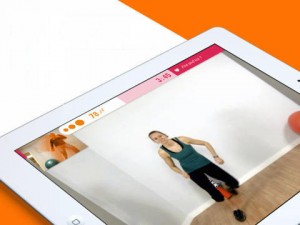 Fitnet, the instructional video fitness app maker that launched in January of this year, has begun its first clinical pilot, a collaboration with the University of Kansas Medical Center (KUMC) sponsored by a $15,000 grant from Mozilla. Fitnet will work with eight families in KUMC's Health Hawks childhood obesity program and provide an iPad and a data plan to each family in the program.
Fitnet, the instructional video fitness app maker that launched in January of this year, has begun its first clinical pilot, a collaboration with the University of Kansas Medical Center (KUMC) sponsored by a $15,000 grant from Mozilla. Fitnet will work with eight families in KUMC's Health Hawks childhood obesity program and provide an iPad and a data plan to each family in the program.
"Most of these programs, in terms of obesity programs or even physical interventions, are 90-day or 12-week programs where they meet once a week," Fitnet founder and "chief geek" Bob Summers told MobiHealthNews. "And the clinician’s desire is to meet with the clients on a more frequent basis. It’s very difficult to do this, the logistics of getting to the clinic and people have every day things going on. So the thought was, 'How can we expand the efficacy of that in-person session into the mobile environment?' And that’s where Fitnet comes in to essentially extend the personal approach of an in-person session into the home."
Fitnet raised $1.4 million in April for its interactive instructional fitness videos, which track users' movements with the tablet's built-in camera in order to give them feedback on whether they're doing exercises correctly. The data collected to give that feedback can also be sent back to a clinician, coach, or therapist, allowing the caregiver to keep tabs on their charges. That's being done for the first time in the KUMC pilot.
"This is the beginning of the next stage for the Fitnet application," said Summers. "We’re introducing clinical tools to deliver the mobile fitness system. It’s a consumer product that’s bleeding over into mobile health."
Summers said the company originally planned to stay in the direct to consumer space for at least two years before venturing into the clinical use case, but they begin to receive solicitations from providers almost immediately after launching, so they are accelerating that timetable.
Fitnet and KUMC originally connected during a Google Hackathon, when they noticed their two programs might fit together well. Both Google and Mozilla are interested in the pilot because it demonstrates a use case for gigabit technologies like Google Fiber that will enable a super-fast Internet -- in this case, delivering patients' workout data to their doctors in realtime.
Summers said that with programs like this one of the hardest things to do is encourage engagement throughout the length of the program, so they'll be excited to track that metric in their small pilot group.
"There’s typically a 50 percent drop out rate in these childhood obesity programs, and that’s in the good ones," he said. "... If we can impact that number in any way, it’s going to be a success."












